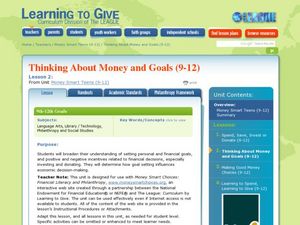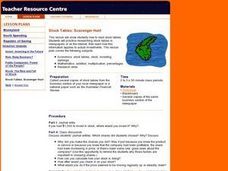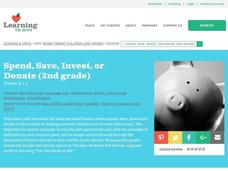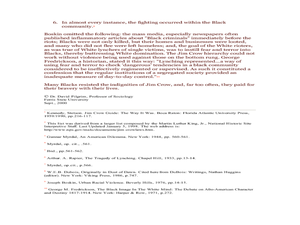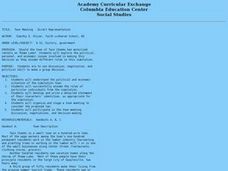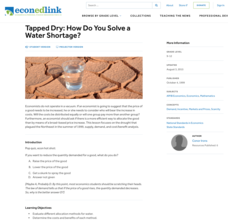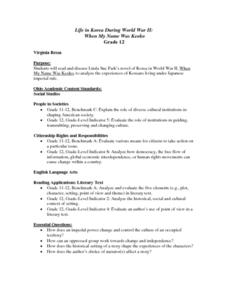Curated OER
Journalism: Quoting Sources
Students examine the use of sources and their quotes in news writing. They determine the reasons specific persons are used as sources and why their opinions are relevant to the article. In groups, they identify sources in articles and...
Curated OER
Thinking About Money and Goals
Students explore the concept of buyer's remorse and impulse spending. In this buyer's remorse and impulse spending lesson plan, students discuss times that they have purchased an item through impulse spending or had buyer's remorse....
Curated OER
Living With Risk: The Human Element of Natural Disasters
Learners explore human elements that are a part of natural disasters, read a Hawaiian myth, conduct a survey, discuss why people choose to live in high risk areas, and participate in a writing activity based on studenT real life accounts...
Curated OER
The Cost of War
Students view a video clip about the cost of war. They discover what goes into paying for a war. They examine the need for a budget in the government. They read a news story about this topic as well.
Curated OER
Human Rights Arts Project and Research Paper
Students examine human rights abuses in thirty countries, specifically explore abuses in Dominican Republic's Trujillo regime, research one country with significant human rights abuses, use Preamble to U.S. Constitution as measure of...
Curated OER
Stock Tables: Scavenger Hunt
Students investigate how to read stock tables and research stock tables in newspapers or on the Internet. They discuss how they would invest $1000 in stock, examine how to keep track of their shares online, and complete a worksheet in...
Curated OER
Will the Real Capitalism Please Stand Up?
Learners analyze descriptions from five different countries to determine which institutional components of capitalism are present and, if so, to what extent. They then place each on a continuum depending upon the number and strength of...
Curated OER
Money Smart children
Students elementary financial vocabulary words: spend, save, invest and donate. In this finance lesson, students respond to the story "Sam and the Lucky Moon." Students describe the concepts of wants and needs, resources, scarcity,...
Curated OER
The Rise and Fall of the Jim Crow Era
Students explore African American history by researching the Jim Crow laws. For this Civil Rights lesson, students define the Jim Crow laws, the reasons they were put into place, and how they were ultimately defeated. Students write a...
Curated OER
Life on the Trails
Fourth graders explore U.S. Geography by completing a worksheet. In this west coast geography lesson, 4th graders discuss the Santa Fe and Oregon-California trails and the people who traveled them in the 1800's. Students define...
Curated OER
Spraying Strawberries
Students decide how many times to spray a strawberry crop. They apply marginal analysis and discover the "law of diminishing returns."
Curated OER
The Future of the Social Security System: Will it Accommodate Future Generations of Americans?
Students investigate the future of the U.S. Social Security program. They conduct research, write journal entries, meet and interview a State representative, create a web page with links, and develop a solution for the Social Security...
Curated OER
Town Meeting
Students organize and stage a town meeting. They write a set of discussion guidelines and participate in a political discussion.
Curated OER
At the Heights of Conflict
Students examine the historic and present conflict between Israel and Syria over the Golan Heights. In groups students present the class with information on the Golan Heights. They write an essay defending his or her view on the future...
Curated OER
Occupational Oxymoron
Students consider their own notions of poverty, examine the life of a woman classified as "working poor" from a variety of perspectives, and present their findings to the class. Then, students synthesize their knowledge in a paper.
Curated OER
Progression's Price
High schoolers reflect upon their regional and national environments, analyze causes of environmental problems as well as their implications, and examine effects of population growth as they participate in "The Popcorn Game."
Council for Economic Education
Tapped Dry: How Do You Solve a Water Shortage?
Students, after evaluating different allocation methods for water, determine the costs and benefits of each method.
Curated OER
Keystone Science School: Sustainable Automobiles
Students explore how to choose the correct car for them based on their needs.
Curated OER
What's Your Angle?
Students examine The New York Times' coverage of immigrants' rights in order to gain an understanding of how different news angles function. They assess the angles of different news media outlets, such as television, radio, and Internet...
Curated OER
China: Commodities Consumption
Students examine the changes that have occured in China's economy. They identify areas of competition between the United States and China. They use the internet to gather more information.
Curated OER
Life in Korea During World War II: When My Name Was Keoko
Twelfth graders review facts about roles of Asia and Japan in World War II, read When My Name Was Keoko to familiarize themselves with daily life and historic events during World War II in Korea, and participate in student-led...
Curated OER
Business Strategy with Asia: Outsourcing or Not?
Learners examine the advantages and disadvantages of outsourcing personnel resources to Asia. They investigate through internet research as well as community business leaders why businesses outsource to other countries. In the end,...
Curated OER
Euthanasia and the T4 Program
Students examine the euthanasia campaign used to rid the world of mentally and physically disabled Germans. Using the internet, they gather information either supporting or disagreeing with the idea of taking a life by euthanasia. They...
Curated OER
Imagery: Symbolic/realistic
Young scholars recognize and use the visual arts as a form of communication. They use the computer as a visual arts tool to gather images for a story they are telling. They discuss related stories that differ in their realistic images. ...



